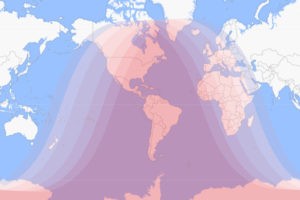Lunar Eclipse over North America on Sunday, May 15th, 2022

The eclipse will be visible in the shaded regions.
There will be a total lunar eclipse which will be visible over North America beginning at night on Sunday, May 15th, 2022 wherein Salat al-Ayaat is obligatory (wajib). For more details about the lunar eclipse and the time it will occur in your respective area, please click here.
Religious obligation:
During a solar or lunar eclipse, it is obligatory (wajib) to perform a special prayer called Salat al-Ayyat. The prayer becomes wajib even if the moon or the sun are partially eclipsed, and even if they do not engender any fear.
When should I perform Salat al-Ayaat?
The time of Salat al-Ayaat sets in as the eclipse starts, and remains till the eclipse is over.
The specific instructions on how to perform the prayer are given below.
Note, that Salat al-Ayaat is not required upon a woman who is in her menses (haydh) or postpartum bleeding (nifas), nor would she be required to make-up the prayer (qadha).
How to perform the prayer of “al-Ayaat”, a two unit (Rakah) prayer with five Ruku in each unit:
1. Make the intention (Niyyah) of offering the prayers as “Salat al-Ayaat”.
2. One should say Takbir: “Allahu Akbar”
3. Recite Surat al-Fatiha and any other Surah*
4. Then perform Ruku.
5. After Ruku, then stand and recite Surat al-Fatiha and any other Surah and then perform another Ruku.
6. One should repeat this action (steps 3 & 4) five times, and when one stands after the fifth Ruku, one should then proceed to perform the two Sajdah (as in the normal Fajr prayer). Then stand up to perform the second Rakah in the same manner as was done in the first Rakah (with the five Ruku).
7. After performing the second set of Sajdah, one should recite Tashahhud and end the prayer with Salam to complete it.
*Please note that a person is allowed to say Takbir and recite Surat al-Fatiha and then divide the verses of another Surah into five parts, and recite one verse or more or less, and thereafter perform the Ruku. One should then stand up and recite another part of the Surah (without reciting Surat al-Fatiha) and then perform another Ruku. This should be repeated and the Surah must be finished before performing the fifth Ruku. For more details see the Islamic Law Book by clicking here.
One response to “Lunar Eclipse over North America on Sunday, May 15th, 2022”
Leave a Comment: Cancel reply
You must be logged in to post a comment.

Salaamun-aleykum
As you have reminded us that during a solar or lunar eclipse, it is obligatory (wajib) to perform a special prayer called Salat al-Ayyat. This note is to highlight difference between what are start and end times of lunar eclipse in astronomical terms compared to as ther are referenced for Salat al-Ayyat purposes.
As I understand, during lunar eclipse the prayer becomes wajib only after moon enters partial eclipse phase, that is prayer as wajib cannot be performed while moon is still in Penumbra phase. Salaat can only be performed as wajib while moon is in partial / total eclipse phase. It becomes qadha once it exits partial eclipse phase and enters in penumbra phase. In other words, before moon enters partial eclipse phase, it is in penumbra phase. While moon is in penumbra phase, the Salaat is not wajib and cannot be prayed before time as wajib Salaat until moon enters partial eclipse phase.
In astronomical terminology, lunar eclipse is supposed to start as moon enters penumbra phase, while in religious terms it is supposed to start when moon enters partial eclipse phase. Thus, if someone uses astronomical time of start of lunar eclipse available on net to perform salaat, they might use start of penumbra phase as start time. In my understanding it won’t be correct as the Salaat has not become wajib.
This difference should be mentioned as a “Caution”, since the astronomical references, like timeanddate link provided by your team, give penumbra phase as start time of eclipse, when Salaat is not wajib yet. A cautionary note should be given such as :
“ The time of Salat al-Ayaat sets in as the partial eclipse starts (cannot be performed in penumbra phase) and remains until the partial eclipse is over and moon enters in penumbra phase”
Please advise, if I have incorrect interpretation
Jazakallah Khairan
Thanks
Anwar